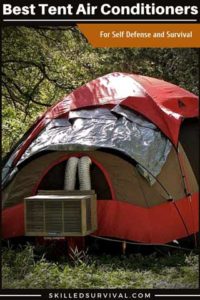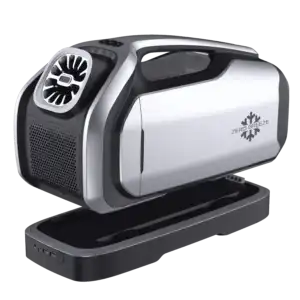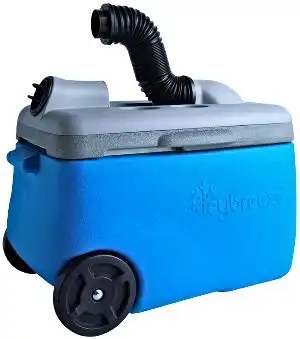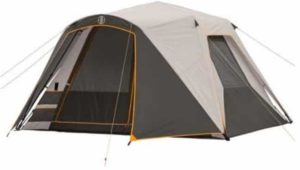Today, I’ve got something really cool to share…
A Complete Guide To Finding A Great Tent Air Conditioner
Because if you’ve been thinking about getting a portable tent air conditioner (a.k.a. tent AC), you’re in luck…
Never before have there been so many options to choose from.
And it will make your summer camping experience 10 times better!
Why? Because nothing ruins a camping trip more than tossing and turning in your own pool sweat.
It’s gross and uncomfortable!
All you need is an air conditioner to start enjoying camping in late July and August.
TOPICS IN THIS GUIDE… ↓(click to jump)
- Best Tent Air Conditioners
- Why You Should Invest In One
- 3 Types Of Camping Tent ACs
- So Which Type Is Best?
- Best Tent Air Conditioner Features
- Thoughts On AC Effectiveness
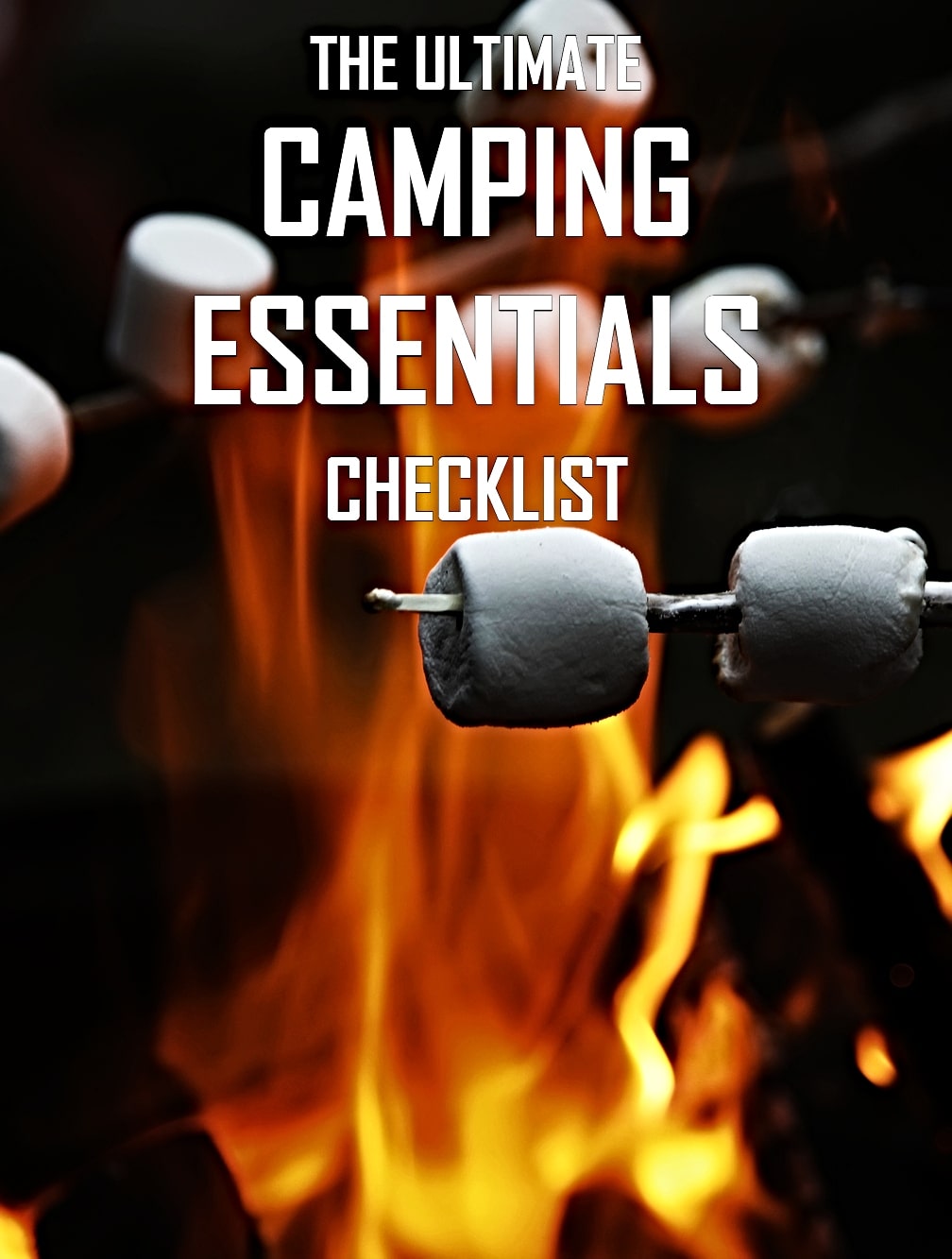
Want a free camping essentials checklist?
Click here to instantly download this Complete Checklist PDF. No purchase necessary.Best Tent Air Conditioners On The Market
Every day, it seems like more and more tent AC’s are flooding the market.
So, let’s go over a few of the best:
The Zero Breeze portable air conditioner is designed specifically for tent camping.
It's a completely battery-powered portable tent air conditioner!
It boasts a 5-hour run time by using a high-performance battery as its power supply.
It has a 10-minute fast cooling effect and achieves this by using a dual hose design, increasing the cooling power by 2 times, 2300 BTU/h.
Which equates to a 40% more efficient cooling system.
Plus, it's both highly portable and quiet. It's everything you've been looking for in a portable tent air conditioner!
↓ Zero Breeze Mark 2
IcyBreeze is a portable air conditioner + cooler in one.
It utilizes cold water at the bottom of the cooler tub to serve as a cooling agent.
So it avoids traditional refrigerants and exhausting heat through hoses is unnecessary.
Making it an ideal solution to use indoors and inside a tent.
An IcyBreeze cooler can dispense cold air up to 35 degrees below the outside temperature.
It includes a 3-speed fan to move air up to 25 mph – maximizing the air-cooling effect inside your tent.
Plus, the IcyBreeze works great for more than just tent camping. It’s also perfect for boaters, pilots, tailgaters, or any outdoor recreation activities.
And don’t forget, it’s also a full-functioning cooler.
So, if you don’t need the AC some days, you can still use the cooler as you would any cooler - to keep your camping food or drinks cold.
IcyBreeze claims they can keep your ice solid for up to 7 days (when not using the AC function).
↓ AC Solution (IcyBreeze V2 Pro)
For those looking for a small window unit to stick into the side of their tent - look no further than this 5,000 BTU ac unit.
It uses a standard 115V electrical outlet and quickly cools a room up to 150 sq. ft. with dehumidification of up to 1.1 pints per hour.
It includes reliable mechanical rotary controls, 2 cool speeds, 2 fan speeds, and 2-way air direction.
And requires a low-power start-up and is quiet.
Why You Should Invest In One
Few newbies realize that camping is a blast if you know how to do it right.
But it’s an absolute nightmare if you do it wrong.
Whenever someone says, “I hate camping,” they usually rattle off inconveniences, such as:
- Bugs (gnats, mosquitoes, ants, etc.)
- Sweltering Heat or Frigid Cold
- Rain and Storms
- Campfire Smoke
- Sleeping on The Hard Ground
- Pit Toilets…
OK, not all those issues are easy to overcome.
Camping isn’t for everyone, especially for those part of a group I like to call – the fragile masses.
But for the rest of us, for the resilient few, these minor inconveniences are easy to overcome.
For example, you should buy a quality camping tent and pack potent bug spray.
You take a thick sleeping pad and a warm sleeping bag.
Or you could even look into a smokeless fire pit.
These camping gear investments make all the difference.
They make your camping adventure much more comfortable.
And if you’re brave enough to camp in the winter, you should look into tent stoves or heaters.
But what about dealing with sweltering heat?
Is there a solution for those who like to camp in the “dog days of summer”?
You bet; it’s called a tent air conditioner.
These fancy devices will take the edge off summer camping and can make it more fun; here’s why:
1. They Allow You To Get A Better Night’s Sleep
I won’t go into much detail about this because it’s self-explanatory.
But I’ll say, a good night’s sleep is KEY to falling in love with camping.
Because of the brutal heat and humidity, you won’t enjoy your trip if you’re up all night.
You’ll be tired and crabby during the day and hot and frustrated at night.
You will not become an avid camper under such torturous conditions…
2. They Give You A Way To Escape The Mid-Day Heat Wave
They not only provide relief at night but also provide relief midday.
The coolest times during a hot summer heatwave are the early mornings and late evenings.
These are the times you’ll want to plan your hikes, your canoeing, and fishing adventures.
But the heat can be brutal right in the middle of the day (from noon to about 4 p.m.).
So, if you’re camping and the midday heat is just too much to bear, hop inside your tent and crank the AC.
It creates a nice, quiet, cool place to read a book, nap, or play a board game with the kids.
3. You Might Be Able To Snag A Better Campsite – (especially last minute)
Finally, people who don’t have a tent ac will often cancel a trip due to the extreme heat.
They see the miserable forecast and decide it’s not worth it.
And their loss is your gain.
Those last-minute cancellations provide a much wider range of campsites available.
You may even be able to snag a coveted site without reservation.
Plus, the campgrounds will be less busy on the “hottest” days of the year.
Again, this is due to people deciding it’s just not worth camping in such hot temps.
The bottom line is:
A portable tent air conditioner is an extreme luxury item when camping.
But once you try it, you’ll never go back.
You won’t need it when temps are mild and the humidity is low.
But many of us live where the humidity is insanely high all summer.
Either way, if you camp even a few times yearly, you owe it to yourself to invest in extra comfort.

Want a free camping essentials checklist?
Click here to instantly download this Complete Checklist PDF. No purchase necessary.3 Types Of Camping ACs
There are three main types of camping air conditioners:
- Refrigerant-Based Window Units
- Refrigerant-Based Portable Unit
- Ice/Fan Based Portable AC Units
1. Refrigerant Based Window Units
These are the same air conditioners used in homes without central air.
They are designed to fit into an open window.
Cool air is forced out of the front of the unit (into the room or tent), and the hot air blows out the back (to the outside).
These work well for homes but are often not ideal for tents. Why?
There are two reasons:
First, it’s a real challenge to fit these units through a tent opening without cutting an additional hole in the tent.
So, you’ll need to destroy your tent to add the unit to the side of it.
Random holes are not ideal if you want to use your tent during cooler months.
However, you can overcome this issue by investing in a tent with a built-in AC port.
Check out this Bushnell Shield Series tent.
It includes a small port perfect for a small window AC unit.
It’s a medium-sized tent and can sleep up to 6.
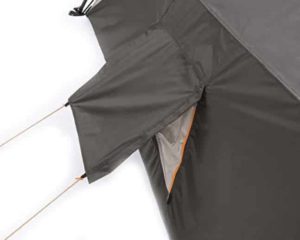
OR
If you want something bigger – check out the Ozark Trail 16×16-feet 12-Person 3-Room Instant Cabin Tent.
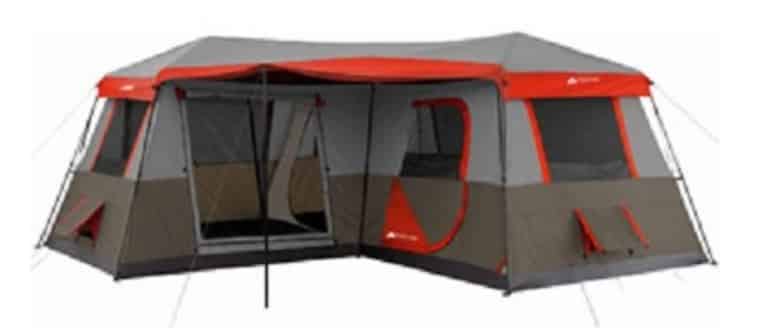
It also includes a heavy-duty rainfly and 7 fully closeable windows.
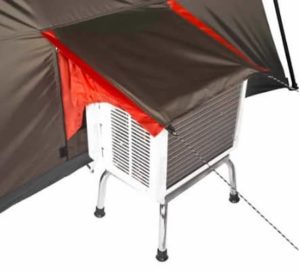
These guarantee a completely dry camping experience.
The bottom line is:
It’s an excellent LARGE tent with a built-in AC port!
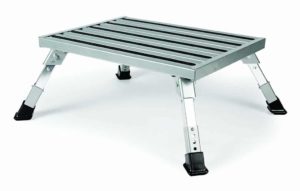
The other major challenge with tent window AC units is that they use A LOT of energy.
Most window units are designed to produce a ton of cool air without power restrictions.
So, unless you can plug into the campsite’s electrical grid – it won’t run long on a vehicle battery.
2. Refrigerant-Based Portable AC Units
These small AC units use refrigerants and hoses to condition the air.
Hoses are a much better strategy for tent camping (vs. window units).
Because with hoses, you don’t need to cut large holes in the side of your tent.
You can run a hose through a door opening and zip it into place.
Also, these portable units are designed with power efficiency as a major feature.
Why? Because the people who designed them understand that portable means limited power options.
Besides the hoses and energy efficiency, they use a cooling process similar to the window ac units.
The one I’m most excited about is the Zero Breeze Mark 2.
Watch the video below for the highlights (and a more detailed review later in this article).
↓ Zero Breeze Mark II Portable AC
3. Ice/Fan Based Portable AC Units
These portable camping air conditioners use a cooler full of ice as a source of cooling.
They are standard coolers with a built-in fan, pump, and hose.
Air is sucked into the cooler, across the ice, and then comes out a hose via a small fan.
Simple, portable, and effective!
The best part about these units is they:
- They function as a spare cooler (keep a few drinks on ice)
- The cooler is sturdy enough to be used as a spare seat (can’t do that with a window unit or other portable units)
- They are much more energy efficient (since all they run is a small fan)
- You don’t need to run hoses (or cut holes in your tent). They move air across the ice (so there is no need to dissipate heat from a refrigerant)
Our favorite cooler-based portable AC unit is the IcyBreeze.
Note: During my research, I found using large blocks of ice to be the most effective.
Large blocks last a whole lot longer than a bunch of small ice cubes.
You can make your blocks of ice by putting water into a large square of Tupperware and putting it in the freezer.
One person suggested putting several large blocks on top of a layer of smaller cubes.
They said this was ideal for several hours of nice, cool air conditioning.
Which Type Is Best?
Honest answer – It depends!
First, it IS possible to use a window unit for some camping situations.
But it’s not flexible enough for ALL camping situations.
So, if you know that you have access to abundant power AND buy a tent with an AC port, then, by all means, take a window unit!
Again, you may want to invest in a tent with a built-in AC port and an AC stand (see the above section for tent recommendations).
But a window unit is nearly impossible if you go camping without access to abundant power.
So you may be left with only portable AC units.
Ones that will work in any location WITHOUT damaging my high-quality tent!
However, you’ll still need to choose between portable refrigerant-based or cooler ice units.
Best Tent Air Conditioner Features To Look For
Size and Weight
Obviously, the lighter and smaller, the better.
You’ll want to be able to carry it around and fit it in a vehicle easily.
Bonus points if it has handles and can also be used for other camping functions (like keeping drinks cold).
Ease of Setup
Nobody wants to spend hours setting up camping.
There are already a ton of things to do when you first arrive at a campsite, such as:
- setting up the tent
- prepared the sleeping pads
- the layout of the sleeping bags
- hang the hammock up
- get all your gear out
- setting up the chairs
- prepare the food
The last thing you want to do is spend extra time getting your unit set up.
Power Efficiency
Power is often the limiting factor when camping.
If you ALWAYS camp in the same place and it has grid power – then power efficiency won’t matter as much to you.
But if you like to camp in remote places, you’ll want something that runs long and uses minimal power.
- The most power-efficient option is the cooler fan AC unit.
- The next best is the small portable refrigerant units.
- Again, window units are a “no go” unless you can plug into grid power.
Extra Power for Electronic Accessories
Some portable tent ACs now come with many “extras” built-in.
I’ve seen some units with extra charging ports and even Bluetooth speakers.
These “extra” features should only be considered “icing on the cake.”
So, if you find a unit with these extras (and all other similar features), choose the one with the bonuses.
Price And Affordability
Price is ALWAYS the great equalizer!
It doesn’t matter if you find the perfect one if it costs $2,000.00 – that’s unreasonable.
However, if a unit is cheap, you’re probably getting what you paid for – a hunk of junk.
Also, prices are relative to YOU, the buyer.
Some folks won’t blink an eye at spending $500 on a camping luxury.
While others wouldn’t dream of spending much more than $50.
The good news is – YOU get to choose from the selection available.
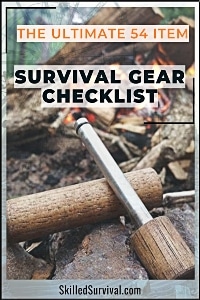
Want a free 54 item survival gear checklist?
Enter your email below to instantly download this Complete Checklist PDF. No purchase necessary. 👇 👇Thoughts On Effectiveness
You must learn two important factors to be satisfied with ANY portable tent air conditioner.
We’ll go through each of these two factors, and I’ll also add my thoughts about them.
What Temperature Drop Do You Expect?
Having a tent AC is better than nothing.
However, the effectiveness depends on how much temperature change you desire.
If you only want to reduce the temperature by 10 or 15 degrees, most portable units will satisfy you.
However, if you expect to go from 100 degrees to 60 degrees, you will be severely disappointed.
Why? Because it takes a tremendous amount of power to drop the air temperatures by 40 degrees.
That’s not realistic.
If this is your expectation, your best bet is to use a large window unit plugged into grid power.
What Size Tent Do You Have?
Another factor you need to consider is the size of your tent. The larger the tent, the harder it is to keep cool.
You’ll have more success the smaller your tent.
Why? Because smaller tents require less cooling power to drop the air temp than larger tents.
Smaller tents require less volume of air to “condition.”
If you have a massive tent and want to drop the temp by 40 degrees, you’ll need a window unit running on full blast.
Instead, if you have a reasonably sized tent and want to lower temperatures by 15 degrees, you have good odds of success.
Final Thoughts
If you’re looking to beat the heat during a summer camping trip, you should invest in a camping tent air conditioner.
I prefer the IcyBreeze cooler because I’m a huge fan of multipurpose survival and camping gear.
I’m all in if it can do two things for the price of one.
But the ZeroBreeze is cutting edge and is fast becoming the easiest way to cool down a tent.
Either way, be forewarned:
Once you get a tent AC, you’ll never go camping without it.
Because you’ll know exactly what you’ve been missing…
Why Trust Skilled Survival...
Go here now to review a full breakdown of:
- Who We Are
- Our Credentials
- Our Mission
- & Product Recommendations...
Here are a few highlights of our teams credentials & certifications:
- Certified Member of a Mountain Search & Rescue Organization
- Plant Emergency & Safety Leader for a Major Food Manufacturer
- Member of the 10TH Mountain Division Hut Association
- Certifications: Avalanche 1, WFR, CPR
- Official Gear Tester for Numerous Outdoor Gear Companies
- Countless Multiday Backpacking trips into Remote Wilderness
- Bachelor's Degree In Mechanical Engineering
- Bachelor's Degree In Civil Engineering
- Bachelor's Degree In Biomedical Engineering
"It takes 20 years to build a reputation and five minutes to ruin it." - Warren Buffett
We're fully aware that trust is NOT something you GET but is EARNED.
And we'll continue to earn YOUR trust through our forthright and honest approach with each new Blog Post, Guide & Product we create...
Prepare, Adapt & Overcome,

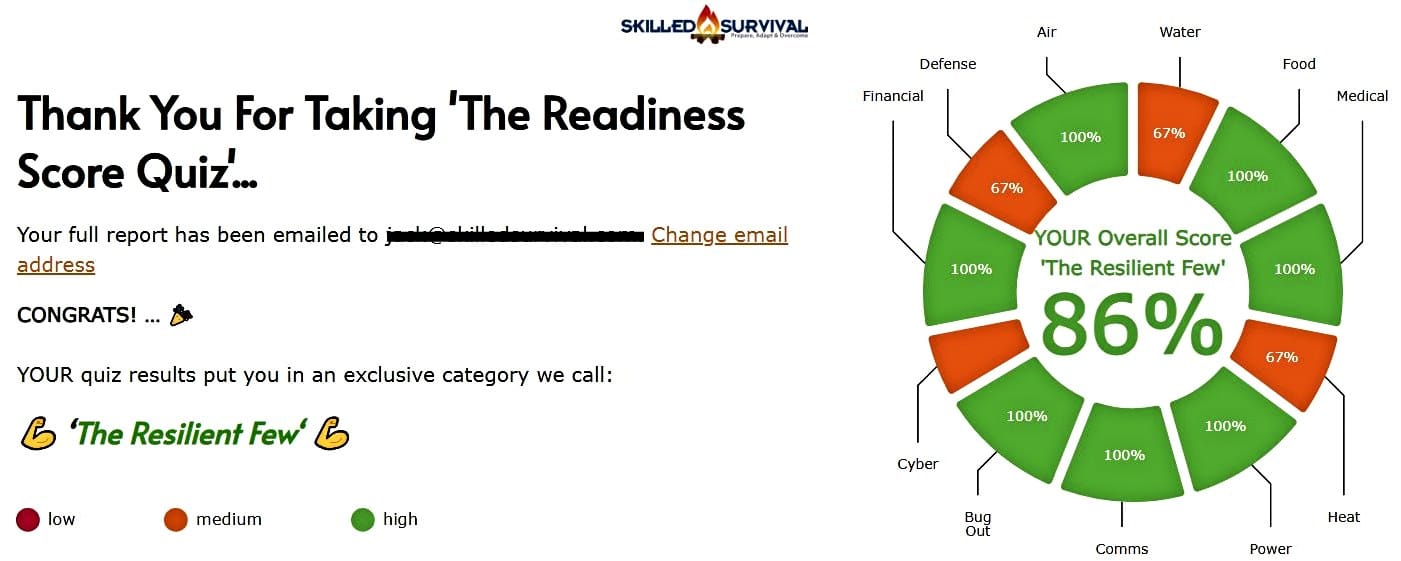
AND... I've still got a few gaps in my preps...🤔 But at least, I'm not part of 'The Fragile Masses'. 👍 Find out where YOU stand by answering a few questions...
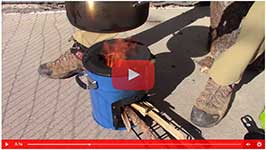
Recommended Reading
Best Cold Weather Tents To Survive Below Freezing Temps
Not all tents are created equal, and most are NOT good enough for winter camping. Here are the best cold weather tents for sale today.
Best Hammock Tents For Minimalist Camping & Survival
The best hammocks are insanely comfortable, durable, look good and 100% worth owning! In this guide, we review the best ones on the market to make your search easy.
6 Best Tent Heaters For Toasty Warm Cold Weather Camping
Camping heaters have come a long way. It must be portable and propane for remote winter camping. Here are the best tent heaters available...
